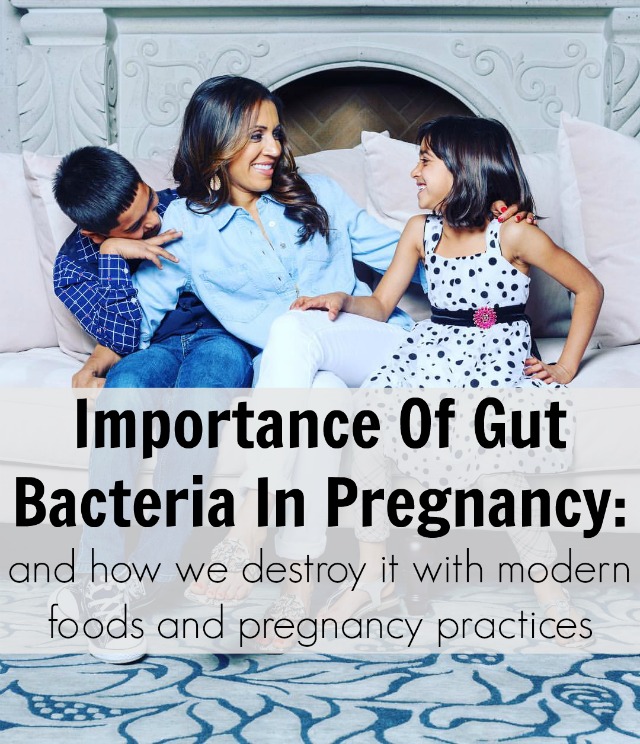This is a guest post written by Dr. Amy Shah, a member of my Advisory Council. Dr. Shah is a practicing physician, specializing in Allergy & Immunology and Internal Medicine. Dr. Shah is also a mom, and as we were recently discussing my pregnancy she brought up a topic that I believe will be very helpful to all of the other mamas-to-be out there! How can you nurture the bacteria in your gut to protect the future health of your child?

{Photo credit: Brad Olson photography}
Nurturing bacteria in pregnancy and childbirth may be the key to unlocking the mystery behind the modern American crisis of diabetes, autoimmunity, asthma, allergies, obesity and more!
Here is how we in medicine think this happens…
There are 2 basic arms of the immune system: Th1 and Th2. These are white blood cells known as T-helpers that recognize and combat pathogens. Th1 fights bacteria, and viruses; Th2 takes on parasites, allergies and, we think, does not have much of a role these days.
During pregnancy the body is weighted towards Th2. The hypothesis is that is so the body does not activate the immune system against the growing fetus. When the baby is born it is also predominantly Th2.
Because of the lack of bacteria (good and bad) and viruses in the modern world, the baby stays weighted towards the Th2 immune side instead of shifting back to Th1 side. This, we think, is why we have seen such an increase allergy, asthma and autoimmune disease!
So what is the take away?
Improve your baby’s life (and yours) by nurturing the bacteria around you. Our bacteria stand as an army blocking or helping things pass through into the body.
I know it’s hard to believe, but there is more bacteria in our body than our cells! Here’s what you can do to grow your gut garden:
1. Avoid hand sanitizers and cleaning products when pregnant!
I can’t tell you how many times I see new mom’s slather hand sanitizer over themselves and anyone who comes close to their little one. The logic is there – of course you don’t want pathogens near your sensitive newborn. But – AND A BIG BUT – is this sterilization may be doing more harm than good by blocking the colonization of nurturing bacteria.
More concerning – ingredients in hand sanitizers are known endocrine disruptors that adversely affect sex hormones, especially in infants and new mothers. Endocrine disruptors are also found abundantly in common triclosan-based cleaning products. Use natural cleaning products when possible (or have someone else clean!)
Tip: Don’t let sick people go near your newborn but for others gentle washing with natural soap and water is preferred.
2. Avoid C-sections when possible.
Of course this isn’t always possible and a C-section is necessary, but if it can be avoided, it should be. Immense difference has been reported in the microbiological constitution of babies born vaginally vs. C-section babies. C-section babies don’t get microbes from the birth canal, which are different than those colonized by the skin, nipple and milk.
A diverse microbiome is significant, as a less diverse microbiome means more chance the immune system will stay in the TH2 – meaning a higher probability of asthma, allergies and obesity related immune disease later in life.
Tip: If C-section is absolutely medically necessary, don’t fret – skin to skin contact, breast feeding, and other techniques to improve baby’s microbiome exist.
3. Avoid antibiotics – and that includes the food you eat!
Again, of course, sometimes antibiotics are necessary and can’t be avoided but we may be overly reliant on them as a panacea for every ill. Generally avoid antibiotics for gut health, but especially for your infant and when pregnant or breastfeeding. They wreak havoc on the gut garden, destroying good bacteria with the bad, decreasing bacterial diversity and even creating a leaky gut and mood disorders.
Foods containing antibiotics can be assumed to have the same effect. Avoid conventional meats and dairy and instead look for products labeled organic – federally regulated to only come from animals never given antibiotics.
4. Play with dirt and animals.
You may have heard of the so-called Hygiene Hypothesis that speculates children raised in overly sterile, germ-free environments develop hypersensitive immune systems. Though it may sound counter-intuitive (and gross), exposing infants in their first year of development to pets, household germs, microbes found in soil, rodent dander and roach allergens appears to lay foundations for a robust immune system, lowering risk of asthma and allergies, according to research from Johns Hopkins.
However, after the first year, the protective effects of exposure to dander, germs and droppings disappear. Playing in the dirt, on the other hand, seems to improve gut health no matter what age you are, so don’t be afraid to be a little dirty!
5. Breastfeed instead of formula feeding.
Don’t be too quick to wean off breast milk and introduce formula or solid food. Colonization and proliferation of an infant’s microbiota can be distressed when exclusive human-milk feeding is stopped. Formula especially incorporated into the diet while breastfeeding can undesirably alter the structure of baby’s gut.
6. Practice Kangaroo Mother Care.
Skin to skin contact, especially right after birth (even for preemies), exposes the newborn to the mother’s bacteria, creating a more diverse gut garden.
Kangaroo Mother Care – basically oodles of naked baby skin on skin exposure several hours a day – has a myriad of additional benefits for baby’s overall health. For example, breastfeeding maybe easier as it aids baby to seek out and latch on to mom’s nipple, reducing soreness.
Studies suggest that babies deprived of skin contact can contribute to mood issues like depression and learning disabilities later in life.
7. Your diet is KING for yourself and your baby.
Obviously diet is top on the list of effectors to the intestinal microbiome. Sugar and processed, chemicalized, artificial foods don’t just upset gut equilibrium but can lead to leaky gut, IBS and other digestive issues you don’t want.
Best course of action for a diet to improve gut health:
-
Eat an organic whole food diet rich in nutrient dense foods like vegetables, fruits, and healthy fats.
-
Steer clear of GMOs, artificial sweeteners, ibuprofen/NSAIDs, preservatives like TBHQ, etc.
-
Eat and drink an abundance of superfoods like algae, seaweed, aloe vera, and cacao.
-
Get plenty of probiotics and fermented foods like kefir and sauerkraut as well as prebiotics like tubers and alliums.
The healthier your gut flora while pregnant and breastfeeding, the healthier your baby’s constitution – establishing their health now and for the rest of their life.

Dr. Amy Shah is a specialist in Allergy & Immunology and Internal Medicine. She pursued her medical training at Columbia University Medical Center, Beth Israel Deaconness/Harvard Medical School, Albert Einstein College of Medicine, and Cornell University. Prior to graduating with honors in research, she worked in the Channing Laboratory at Harvard University looking at the health effects of heavy metals on the body. She is now in a private medical practice. To learn more about Dr. Shah, visit amyshahmd.com.








Love this article-however I need to say that #5 is upsetting. As a mother who was planning on exclusively breast feeding for as long as possible I was heart broken when I had to start supplementing at 1.5 months due to weight gain and supply issues. I tried everything to increase my supply from diet to herbal supplements, water intake, rest, sleep pumping every 2 hours. It was extremely stressful for myself and my family. While I understand the important of spreading knowledge and facts about breastfeeding, reading this made me feel like a terrible failure of a mother to provide for her child all over again. I have to believe that fed is best and that maybe you might consider cases like mine when writing something so absolute in one of your articles. I can’t imagine I’m the only one.
I hope you take this as constructive NOT hurtful or critical. Thank you for listening and keep doing what you’re doing!
I think what Dr. Shah is encouraging is if you are able to breastfeed – you should. I hear your concerns and no matter what is “medically” best – you will always be the best mother you can and don’t let less than perfect situations ever get you down please! As a new mother, I know how challenging it is to live up to the highest standards – we are all doing the best we can!
Very insightful, and so important for all – thank you!
Hello 🙂 can you please tell me which probiotics you
Like? I really enjoy your articles. Thank you for all your hard work to help all of us be more informed and safe.
I also an interested in which probiotic supplements you recommend. After having a emergency c section. Then enduring a horrific case of constipation from the drugs I had to take, I ended up with a stone in my appendix. Sugery was not an option because of the c-section I recently had. So, I was pit on antibiotics for three months until surgery was possible. This wiped out my healthly gut. I then immediately contracted c-dificile. For those who don’t know, this is a nasty bacteria overgrowth that can eat through your intestinal wall. The only thing to kill it was more antibiotics unfortunately. All this time I have been taking probiotics and drinking kombucha. I’m slowly regaining my gut and I soon want to add homemade fermented veggies, but I’m always looking for the best probiotics. I just feel like some of them don’t seem to do much!
Hi,
any thoughts about sugarcane fiber (kfibre)?